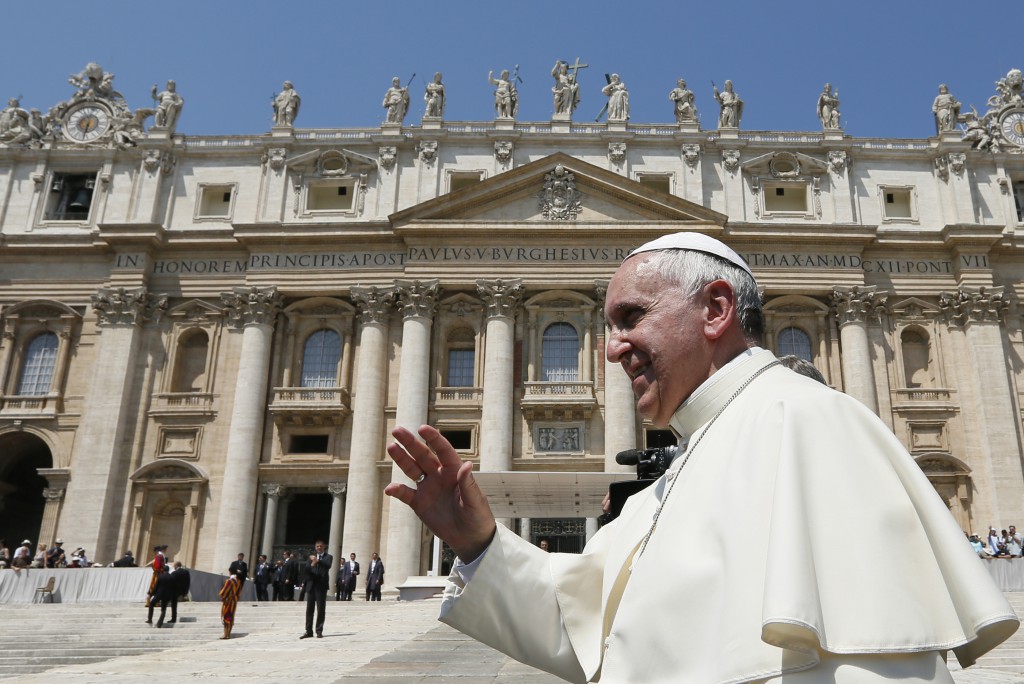

VATICAN CITY (CNS) — Estimates of the number of people around the world who are victims of human trafficking are rising, partly because globalization has made it easier to move people and partly because governments, churches and international organizations are better at recognizing the phenomenon, a U.S. government official said.
Luis CdeBaca, ambassador-at-large in the State Department’s Office to Monitor and Combat Trafficking in Persons, held a digital video conference July 29 with priests and religious, ambassadors accredited to the Holy See and journalists gathered at the office of the Pontifical Academy of Sciences.
[quote_box_right]Full report[/quote_box_right]The conference and discussion about the U.S. State Department’s 2014 Trafficking in Persons Report took place on the eve of the first U.N. World Day Against Trafficking in Persons.
[quote_box_right]Full article[/quote_box_right]Pope Francis has called human trafficking “a crime against humanity.” Meeting trafficking survivors, religious sisters caring for victims and dozens of senior police officials in April, he called human trafficking “an open wound on the body of contemporary society, a scourge upon the body of Christ.”
Participants at the July conference, sponsored by the U.S. Embassy to the Holy See, focused particularly on victims and survivors of trafficking, repeatedly quoting Pope Francis’ exhortations to touch and heal the wounded body of Christ in the person of those exploited and enslaved by others.
Agreeing with John McCarthy, Australia’s ambassador to the Vatican, that Pope Francis has brought the issue of human trafficking back onto the public agenda, CdeBaca said one of Pope Francis’ key contributions has been “not just talking about, but living this notion of touching the flesh of Christ.”
Trafficking ensnares people who are vulnerable economically or socially, he said, but the victims “are not weak. They are often the strongest ones. They are often the ones who are willing to travel for a new and better life,” but are tricked by smugglers.
[pull_quote_center]Ken Hackett, the U.S. ambassador to the Holy See and co-host of the conference, said, “Whether it’s child labor in Southeast Asia, organ trafficking in Central America, sex trafficking in the Middle East or Eastern Europe, child soldiers in Africa, or labor exploitation in the United States, trafficking touches virtually every part of our global community.”[/pull_quote_center]
Bishop Marcelo Sanchez Sorondo, chancellor of the Pontifical Academy of Sciences and chair of the interreligious Global Freedom Network, described human trafficking as “an accelerator of criminal wealth creation,” pointing to the International Labor Organization’s estimate that organized crime networks reap about $150 billion a year from trafficking in persons, about 80 percent of that from prostitution.

CdeBaca said that whether a country outlaws prostitution, makes it illegal to pay for sex or legalizes and regulates prostitution, every country has a problem with people being trafficked for sex.
In a similar way, he said, traffickers exploit immigration laws, convincing victims of poverty and violence that they are the ones who can get them to safety and a better life.
Comprehensive immigration reform in the United States would help, he said. Helping people in the country illegally gain legal status would bring them “out of the shadows,” removing the fear of deportation that keeps many from denouncing their exploiters.
A well-organized system for matching up U.S. labor needs with people who want to go to the United States to work, bypassing the smugglers, also would help, he said.
Poverty is the driving force behind trafficking, participants said.
“People end up having to use themselves as collateral,” CdeBaca said. “If they had credit cards, if they had the ability to take a loan out on their parents’ house so they could buy a new roof for their parents, they would not have to basically use themselves as the loan.”
— By Cindy Wooden, Catholic News Service.
[quote_box_left]Related articles:
- A life reclaimed: DIGNITY program transforms women who see selves as ‘throwaway’
- Pope shines spotlight on trafficking[/quote_box_left]





